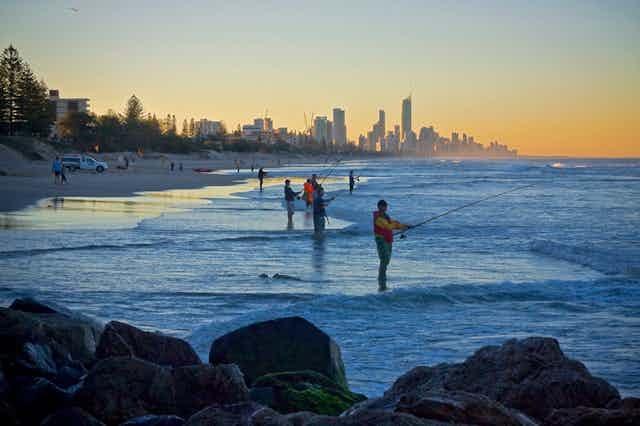Last year the current government unveiled plans for the world’s largest network of marine parks around Australia’s coast. Now the Coalition has pledged to put a pause on the plan should it form government. The Coalition will halt all plans for new protected areas, and consult further with the fishing industry.
After many years and many dollars spent planning Australia’s network of marine protected areas, how has it come to this?
Some may say that politics has reared its ugly head in the debate, and argue that we need to base our decisions firmly on ecological evidence rather than social and political concerns. But this “political interference” may be a result of a failure to adequately engage fishers and their values, aspirations and concerns in the planning process. Strengthening the process will require giving affected fishing communities more say in decision-making, not less.
So, what are the benefits of consulting with fishers, and how could we do it better?
Marine parks can have substantial ecological benefits, providing refuge for species and habitats from from destructive or extractive uses. While recreational and commercial fisheries in Australia are generally well managed, as an activity it does carry some risk to some species or habitats.
Also, while marine parks are often set up for biodiversity protection, parks can also have flow-on benefits for nearby fisheries. These positive outcomes are well recognised within the scientific community and generally by fishers.
But commercial and recreational fishers often feel strong attachment to fishing, and to the familiar places they go fishing. So when they are told they can no longer fish in certain areas, fishers want to be actively included in decisions. They want to know why they need to be excluded, and what the benefits will be for them and the fish they care about.
There is ample evidence (see also here, here, and here) that better engagement with fishers can lead to increased support for decisions, reduced compensation claims, and better compliance with no-take areas.
On the other hand, when fishers feel slighted, support for marine parks can be lost. Public opposition can result in significant delays for new policies as people protest about the changes. Opposition can result in changes to plans that may reduce their initial effectiveness, decrease compliance, and reduce public support for management agencies.
In New South Wales, shortly after winning government, the Coalition reversed the former Labor government’s expansion of marine park protections in response to lobbying by the fishing industry. This included revising the protection of some shark species.
Now we face the real possibility that something similar might happen on the national scale. The fact that fishers keep bringing their concerns to the political arena suggests something is missing.
Engaging fishers is about more than consulting people through public meetings and written submissions. It means collecting and providing scientific information about the social, economic, and ecological costs and benefits of planned marine parks. It would ideally involve fishers in collecting that information so that it is trusted and accepted.
Planning would then allow people to have input into final decisions on marine parks; their placement and the rules surrounding them. Such a process would encourage ownership, trust, and collaboration, compliance and stewardship, and reduce the impacts of marine parks on affected fishers.
In a democratic society, people have a right to have a say about decisions that affect them, including decisions about access to the natural environment. Fishers will always have the option of taking their concerns to the political arena if they feel the planning process has not addressed their needs or concerns.
When that happens, decisions are made for political reasons, and scientific information is often ignored. Meaningful engagement is needed to reduce the likelihood that fishers take their concerns into the political arena.
There is no one-size-fits-all approach to engaging fishers in marine conservation and marine protected area planning. Proponents of marine parks must be prepared to design engagement programs that fit the situation at hand and give fishers genuine input into decisions that affect them.
Will this mean that we might have to compromise on our ecological objectives at times? Maybe. But that would be better than having decisions made at the political level, where conservation objectives take a back seat to political lobbying and vote grabbing.

